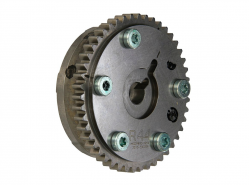— A Honda VTC actuator class action lawsuit has been certified in two states (California and Illinois) after owners complained their vehicles rattled a few seconds on cold starts.
According to the plaintiffs, Honda injured them by failing to tell them about defective variable valve timing control (VTC) actuator 14310-R44-A01 in these models.
- 2012 Honda Accord (L4 engine)
- 2012-2014 Honda CR-V (2.4-liter engine)
- 2012-2015 Honda Crosstour (L4 engine)
In 2012, plaintiff Mary Quackenbush purchased a new 2012 Honda CR-V from a California dealer. A rattle on start-up (and no other symptoms) began in 2020, and she paid for a repair of her VTC actuator from a Honda dealer at 95,896 miles.
California plaintiff Anne Pellettieri purchased a new 2014 Honda CR-V from a dealer in 2014 and allegedly first heard a rattle one to two years after purchase. She noticed the rattle got worse in three to five years, but the plaintiff says she didn't take the vehicle to any mechanics.
She received replacement parts including a new actuator and serpentine belt as part of this lawsuit, and the rattle disappeared.
Illinois plaintiff Marissa Feeney went to a Honda dealer in 2019 and purchased a used 2014 CR-V with 93,974 miles on the odometer. Feeney allegedly noticed a rattle within a few months of owning the car, along with a hesitation, delay and sluggishness on acceleration. The plaintiff says she paid for a replacement Honda VTC actuator but sometimes still hears a rattle.
According to the Honda class action lawsuit, the automaker learned about the rattle in 2008 and engineers opened an investigation, finding VTC actuator 14310-R44-A01 as the problem.
Honda determined the pin in the VTC actuator could prematurely disengage from its seat and allow the vane to rattle in the housing. The rattle will last only a few seconds because oil pressure builds up and cushions the assembly.
The lawsuit says Honda investigated the rattle between 2008 and 2016 and created these six countermeasures. The final repair involved replacing VTC actuator 14310-R44-A01.
- 12/03/2007 — U-Groove width sorting at Denso
- 9/11/2008 — Select Fit to achieve target Stopper Pin Depth
- 9/10/2009 — DC – Revise Pin Depth Spec from 2.02mm-5.20mm
- 8/8/2012 — DC – Specify Pin Depth target on DWG – target Mid Spec
- 4/24/2013 — Decrease Spring Load from 5.78 to 3.64N
- 9/24/2015 — Design Change A1508259 issued for 14310-R5A-305
Some Honda vehicles received countermeasures one, two and three, while other vehicles received countermeasure four and some received countermeasure numbers four and five.
Honda VTC Actuator Class Action Lawsuit Certified
The Honda class action lawsuit has been certified for the following customers and locations.
Plaintiff Anne Pellettieri will represent a California class of new and used purchasers of vehicles equipped with VTC actuator 14310-R44-A01 from California Honda dealers, and former owners who resold or traded in to California Honda dealers.
Plaintiff Mary Quackenbush will represent a California repair class of consumers who purchased new or used Honda vehicles equipped with VTC actuator 14310-R44-A01 from California Honda dealers, and who paid to have their VTC actuator repaired by California Honda dealers.
Plaintiff Marissa Feeney will represent an Illinois repair class of consumers who purchased new or used Honda vehicles equipped with VTC actuator 14310-R44-A01 from Illinois Honda dealers, and who paid to have their VTC actuators repaired by Illinois Honda dealers in Illinois.
The Honda VTC actuator class action lawsuit was filed in the U.S. District Court for the Northern District of California: Quackenbush, et al., v. American Honda Motor Company, Inc., et al.

